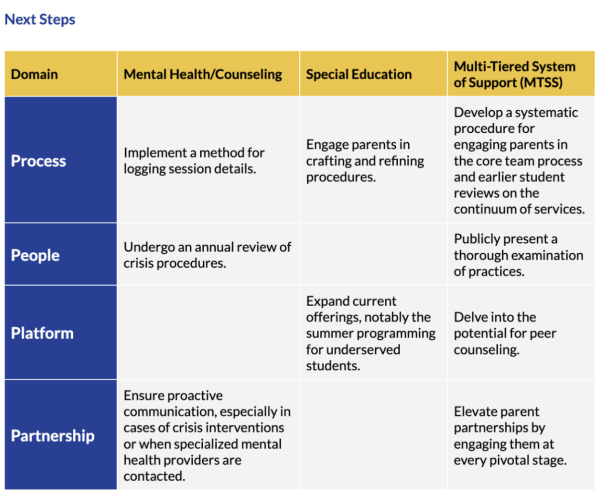In the past decade, mental health struggles have hit America’s teenagers especially hard. Feelings of “persistent sadness and hopelessness” increased by 40% among young people in the past 10 years, and one in seven 10-19-year-olds suffer from a mental disorder.
LFHS is no exception to this trend, and attending a top-ranked school comes with high expectations that often worsen mental health conditions.
The combination of COVID-19, multiple student deaths over the past decade, and the pressures of living in a high-achieving community are factors LFHS has identified as contributing to the mental health crisis.
“In my experience at LFHS the vast majority of NHS (National Honors Society) students are primarily running their engine in fear of failure,” said social worker Dan Maigler. “This fuel is highly effective and reliable but it is corrosive and destructive to mental health over time.”
Recognizing these issues, the Board of Education turned to psychologist Dr. Daniel Cates to review the services provided to students, including mental health and special education resources. From March to May of 2023, Cates conducted an investigation of the school, primarily through in-depth conversations with faculty members, parents, graduates, and professionals.
“The combination of a global pandemic, heart-wrenching student tragedies over the past 12 years, and the inherent pressures of its high-achieving community backdrop makes addressing student mental health pivotal,” Cates wrote in the report. “The profound ramifications of which still resonate within the school’s corridors.”
On many levels, LFHS’ support systems are very effective at addressing student needs, according to the report. For one, staff members demonstrated a “strong commitment and personal dedication to developing students into quality individuals.” Additionally, the school campus is safe and “designed for learning,” while faculty maintain levels of professionalism and show concern for student welfare.
LFHS practices a “multi-tiered system of support,” which has been especially effective at providing immediate assistance to students. This model was highlighted as a strength in LFHS’ evaluation and “exemplifies the positive impact of frequent monitoring and adjusted interventions tailored to each student.”
Despite LFHS’ abundance of mental health and special education services, the report addressed multiple gaps in these systems.
His report found that while LFHS has “dedicated” Core Teams who work “diligently” to address student needs, there are “procedural shortcomings” that contribute to the “inconsistent practices” creating miscommunications and gaps in LFHS’ support systems.
For example, the report found gaps in communication between staff and parents/guardians regarding student visits to the social workers or dean’s office. In some cases, parents were unaware of the frequency that their child visits the social worker’s office. Some students were missing many classes. LFHS is working to establish protocols to enhance communication.
The report states that “the process by which students are encouraged or approved to unilaterally seek support on an as-needed basis, without a ‘pass’ or scheduled appointment, is a process in need of review.”
Some of these new protocols, however, may come at the expense of student well-being.
“Now we can only clear students if they are in immediate crisis, which is more in line with how other high schools operate,” said Maigler. “This change will have both positive and negative results. More students will likely be in class more often, but more kids will also probably be found crying in bathrooms or going to the nurse because they can no longer get the help they sought from social workers.”
The report noted a recent surge in the sheer number of students requesting mental health services, and suggested a “restructuring” of the current services provided in order to meet the demand. In some cases, this may mean directing students towards private specialists.
Cates was also asked to review the status of the special education services provided at LFHS. Approximately 12% of the student body qualifies for special education services. These services include IEPs (individualized education plans) and 504s, plans curated for individual students that require educational accommodations.
On one hand, the report praises LFHS’ extensive co-teaching model, which allows students to participate in the “general curriculum” who would not otherwise be able to. The report also praises the new director of special education, who is expected to bring a “rejuvenated togetherness to the special education department.”
While the special education department is successful in many areas, the report addresses a concern regarding models of IEPs. Recently, LFHS switched to a different model of IEP support, and the study deemed the communication of this switch ineffective. The lack of communication left parents and students frustrated and is another area where LFHS will enhance communication with parents and guardians in the future.

Among all the findings, the report stresses the importance of enhancing the current communication system between students, social workers, parents, and outside service providers. When a member of an LFHS service team recognizes an issue in a student, the report suggests creating a “standardized procedure” to make sure parents and a professional specialist the student may have to make sure all three parties are aware of the student’s situation.
The reviewer stressed that the “Core Teams” – including a social worker, school psychologist, guidance counselor, and dean – “dedicate themselves to the diligent, heartfelt work of responding to the many needs, challenges, trials, tribulations, and developmental tasks inherent in a public high school of ~1,400 students.”
In the midst of a national mental health crisis, there will likely be an increase in the number of students utilizing student services in the near future. The report proves that LFHS has a substantial special service system that is especially effective at addressing student needs – and as they work to address communication concerns – these services will improve and continue to serve students.









Jason Kowalski • Nov 12, 2023 at 6:09 pm
I’m sorry about the oddly personal wall of text below.
Personally, I found that accepting the possibility of failure has done more for my mental health than anything which the school or a paid therapist has tried.
Students tend to be burdened by the expectation that they must not only pass, but that they must get competitive grades in every field, taking several AP courses every year. This often is due to the (somewhat truthful) belief that doing well in high school is essential to success in University, which in itself is a prerequisite to a higher-paying job. However, all of this is justified by the notion that we must all toil in the workspace to raise a family and retire until our natural death.
Personally, I have been liberated by a relatively low will to live. While I still want to stay alive and enjoy what little time I have left before I die, I am not deluded by a notion of higher purpose or work ethic. I am not so strongly tied to the notion of survival that I would destroy myself just to have a chance of gaining the many doctorates necessary to become an underpaid fry cook. I am free to put off the responsibilities that society has forced upon me, to focus instead on the things that bring a dose of happiness into my life.
Through depression, I gain serenity. Through pessimism, I gain euphoria. Through neglecting the future, I embrace the present. Through abandoning survival, I truly begin to live.